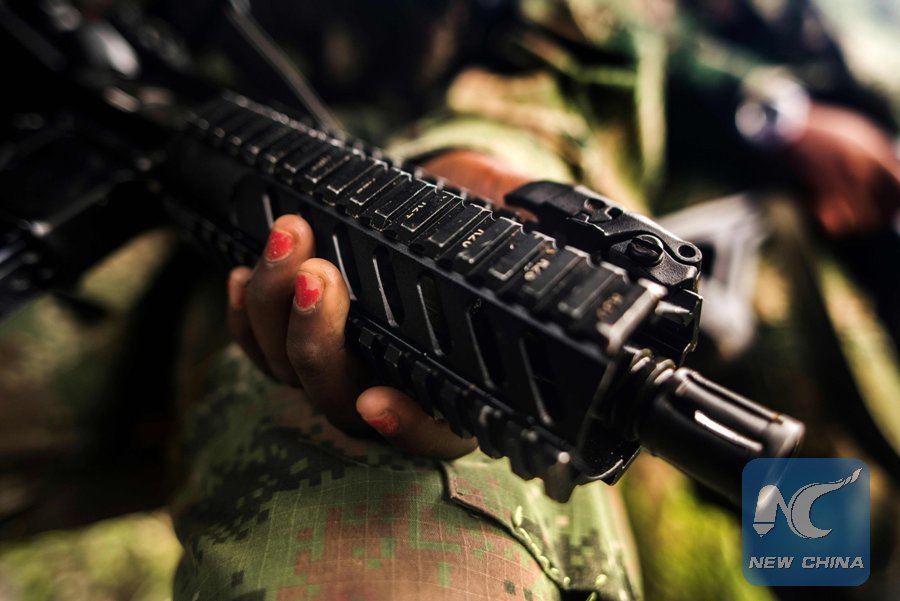
File photo taken on Nov. 20, 2017 shows a member of the "Omar Gomez" Western War Front of the National Liberation Army (ELN) guerrilla holding her gun in a camp on the banks of the San Juan River, Choco department, Colombia. (Xinhua/AFP)
UNITED NATIONS, Jan. 10 (Xinhua) -- Head of the UN Verification Mission in Colombia said Wednesday that prospects of peace with the rebel National Liberation Army (ELN) remains uncertain as a temporary cease-fire has expired and the ELN leadership has not shown enough political will.
"The ELN has voiced very strong reservations on the implementation of the temporary cease-fire and the humanitarian commitments attached to it. And while the ELN leadership has proposed the negotiation of a stronger cease-fire, they have remained silent on their posture after the end of the temporary cease-fire yesterday," Jean Arnault told the Security Council.
As hardly 24 hours have elapsed since the government and ELN delegations have resumed their talks in Quito, Ecuador, it is therefore too early to venture a sense of what the future holds in terms of the situation on the ground and at the negotiating table, said Arnault, who was briefing the Security Council on the mission's work in the first 90 days.
Attacks against oil pipelines by the ELN have just resumed, he noted.
The UN Verification Mission in Colombia, mandated by the Security Council, began operations on Sept. 26, 2017. The mission, which succeeds a UN mission of unarmed observers to monitor and verify a cease-fire between the Colombian government and the larger rebel group of the Revolutionary Armed Forces of Colombia (FARC), is tasked to verify the reintegration of FARC fighters and also to watch the temporary cease-fire with the ELN.
Arnault was cautiously optimistic about the developments with regard to FARC, noting that both the Colombian government and the FARC leadership remain committed to carrying forward the peace process despite the many difficulties in the past few months.
"Much is still needed to keep the process on track and make it stronger. But with this political will, the appropriate resources and a sustained effort, much can be accomplished," he told the Security Council.
Arnault was heartened by the long-term deployment of security forces in about 600 of the more vulnerable rural districts in the areas most affected by the conflict, including the districts where community leaders, human rights defenders, promoters of coca substitution and land restitution advocates have been assassinated.
"It is difficult to overestimate the importance of that decision in our view. Control of territory by the state is inseparable from permanent physical presence of state institutions in those areas. An occasional presence is bound to leave the old or new illegal power structure intact," he said.
One of the specific objectives of the deployment is to pave the way for more proactive social and economic support by civilian state institutions, he stressed.
The disposal of FARC arms caches has resumed under the responsibility of the military and with the cooperation of former FARC combatants, he reported.
The Colombian government and FARC struck a peace deal in August 2016 after four years of negotiations in Havana, Cuba, ending a five-decade-long conflict in the South American country.

